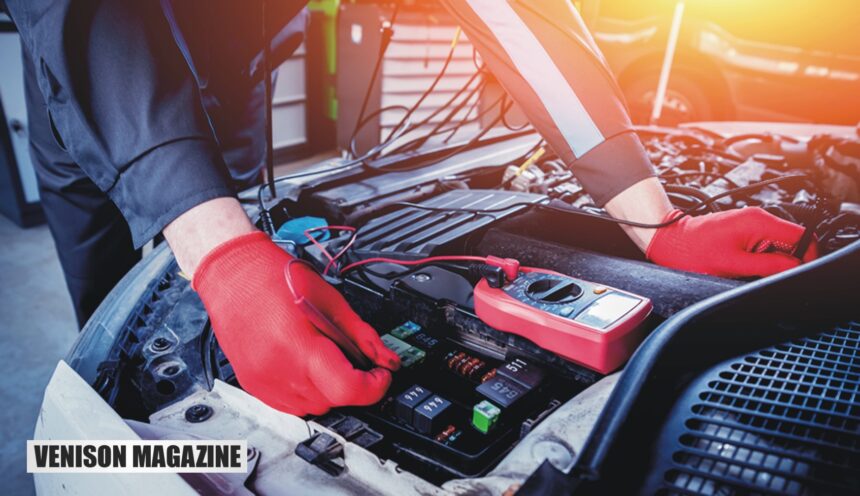Introduction to Auto Electrical Repair
When you turn the key in your ignition and hear that familiar purr of the engine, it’s a moment of pure joy.
But what happens when you get nothing but silence? Auto electrical issues can strike unexpectedly, leaving even the most seasoned drivers feeling puzzled.
From flickering lights to malfunctioning power windows, these problems often feel daunting.
The good news is that with a little knowledge and preparation, you can tackle auto electrical repair like a pro.
Let’s explore how to navigate this crucial aspect of vehicle maintenance so your car stays reliable on every journey.
Common Issues with Auto Electrical Systems
Auto electrical systems are complex and can present various issues. One common problem is a dead battery. This often results from leaving lights on or a failing alternator.
Another frequent issue involves blown fuses. Fuses protect circuits but can easily blow due to overloads or shorts, disrupting power supply to essential components.
Wiring problems also plague many vehicles. Corroded connections or frayed wires may cause intermittent failures, leading to frustrating situations.
Additionally, malfunctioning sensors can affect everything from engine performance to safety features like airbag deployment.
Ignition system troubles often result in starting difficulties. Faulty spark plugs or ignition coils may leave you stranded when you least expect it. Keeping an eye on these potential problems is crucial for maintaining your vehicle’s performance and reliability.
Signs That Your Car Needs Electrical Repair
Your car often communicates with you through its various systems. If you’re noticing any unusual signs, it might be time for auto electrical repair.
One common indication is flickering dashboard lights. If they dim or brighten unexpectedly, there could be a problem with your battery or alternator.
Another sign is difficulty starting the engine. A sluggish start may suggest issues with your starter motor or wiring connections.
Strange sounds can also signal trouble. Buzzing or clicking noises when using accessories indicate potential electrical faults that need immediate attention.
If you experience frequent blown fuses, it’s essential to investigate further. This recurring issue points to underlying problems in the circuit system that shouldn’t be ignored.
Stay alert to these signals; they can save you from bigger headaches down the road.
Finding a Reliable Auto Electrician
When it comes to auto electrical repair, finding a reliable electrician is crucial. Start by asking friends or family for recommendations. Personal experiences often lead you to trustworthy professionals.
Next, check online reviews. Websites like Google and Yelp provide valuable insights into customer satisfaction. Look for electricians with high ratings and positive feedback regarding their expertise.
Don’t hesitate to ask about certifications and experience. A qualified auto electrician should have the necessary training to handle various electrical issues in vehicles.
Consider visiting local shops as well. Engaging face-to-face allows you to gauge professionalism and communication skills firsthand.
Inquire about warranties on repairs. A reputable technician will stand behind their work, offering peace of mind along with quality service.
Understanding the Cost of Auto Electrical Repair
The cost of auto electrical repair can vary widely, depending on several factors. Labor rates differ from one location to another, and the complexity of the issue can impact pricing too.
For straightforward fixes, such as replacing a blown fuse or a faulty light bulb, you might spend less than $100. However, if you’re dealing with more intricate problems like wiring issues or malfunctioning control modules, costs can climb significantly.
Parts availability plays a crucial role in determining expenses as well. OEM parts usually come with higher price tags compared to aftermarket alternatives. Keep this in mind when discussing options with your mechanic.
Always ask for detailed estimates before proceeding with repairs. Transparency helps you understand where your money goes while ensuring that you’re not caught off guard by hidden fees later on.
DIY Tips for Basic Electrical Repairs
Tackling basic electrical repairs in your car can be rewarding and save you money. Start with safety first—always disconnect the battery before working on any electrical components.
Check for blown fuses as a common issue. Replacing a fuse is simple and requires just a few tools. Make sure to use the correct amperage to avoid future problems.
Inspect wires for fraying or corrosion. If you spot damaged wiring, it’s essential to repair or replace it promptly. Electrical tape can temporarily fix minor issues, but consider replacing compromised parts long-term.
For lighting issues, clean bulb sockets and ensure connections are tight. Sometimes, dirt can cause poor contact leading to malfunctioning lights.
Keep a multimeter handy; it helps diagnose voltage levels effectively. Understanding how your car’s electrical system works will empower you during repairs while enhancing your skills over time.
Importance of Regular Maintenance and Inspections
Regular maintenance and inspections play a crucial role in the longevity of your vehicle’s electrical system. Just like any other part of your car, the electrical components require attention to function optimally.
Routine checks help identify potential problems before they escalate. A small issue, if left unattended, can lead to more significant repairs and higher costs down the line.
Furthermore, preventive measures ensure that all connections are secure and free from corrosion. This reduces the risk of unexpected breakdowns while you’re on the road.
Scheduling consistent inspections also enhances safety. Properly functioning lights, signals, and battery systems are vital for safe driving conditions.
Embracing regular maintenance can save you time and money in the long run while keeping your vehicle running smoothly. Prioritizing these practices fosters peace of mind as you navigate daily commutes or long journeys.
Conclusion
When it comes to auto electrical repair, preparation is key. Understanding your vehicle’s electrical system can save you time and money. Recognizing common issues and signs that indicate a need for repairs will help you address problems early on. Finding a reliable auto electrician ensures that your car gets the proper care it needs.
Consider the costs associated with repairs so you can budget accordingly. While some basic fixes may be manageable on your own, knowing when to call in an expert is crucial for safety and efficiency. Regular maintenance and inspections play a vital role in keeping your vehicle running smoothly.
Taking these steps can make all the difference in maintaining your car’s performance and longevity. Stay informed, proactive, and you’ll find navigating auto electrical repair becomes much easier over time.




